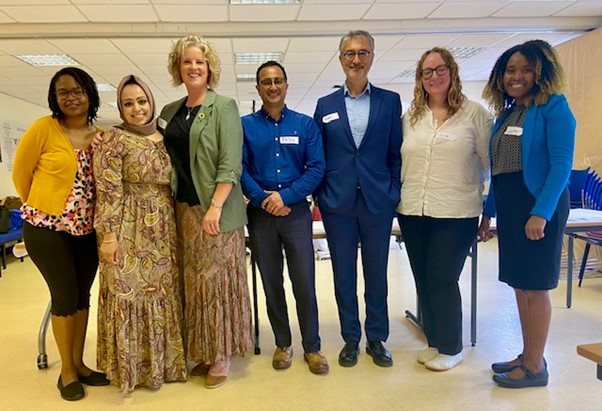
Tree of Life: Meet the Research Team
Tree of Life is a new public engagement installation showcasing how creative arts can be used to communicate research. It will be held in the Manchester Museum’s South Asia Gallery to coincide with World Cancer Day 2025. The installation has been co-created by academics within The Faculty of Biology, Medicine, and Health (FBMH) as part of the University of Manchester’s commitment to improving cancer outcomes globally.
The multidisciplinary research team behind the project came together with funding from Greater Manchester Cancer, to explore the lower rates of breast cancer screening uptake among women from Pakistani, Bangladeshi, and Indian heritage. Here, the team offer insight into their own backgrounds and research interests.
Dr Binish Khatoon
 I am a qualitative methodologist at the University of Manchester with over 10 years of experience in health research. I have worked with patients with cancer, primary care staff, secondary care staff, people living with dementia, and currently working with ethnically minoritised women to understand health inequalities in breast cancer care.
I am a qualitative methodologist at the University of Manchester with over 10 years of experience in health research. I have worked with patients with cancer, primary care staff, secondary care staff, people living with dementia, and currently working with ethnically minoritised women to understand health inequalities in breast cancer care.
My projects have been exploratory qualitative studies trying to explore the lived experiences of participant. For example, understanding the emotional climate in maternity departments, and exploring the work-related engagement and wellbeing in ambulance service staff.
A key part of my identity as a researcher has been to create safe spaces and trust for participants to feel safe, confident and empowered to share their honest thoughts and experiences. I have used creative arts such as narrative therapy (Tree of Life) and engaged with participants in different ways, tailored to the community needs. I believe that by using creative arts, I have created safe spaces for participants to feel comfortable to share their honest thoughts, and my ability to build empathy through story telling has further developed my skills as a methodologist.
I believe in understanding diversity within communities to engage ethnically-minoritised people in research activities and I am an advocate for the improvement of ethnicity categorisation in health research to adequately capture the broad range of communities among ethnically minoritised communities.
Throughout my research activities, intersectional reflexivity has been a beacon of research accountability and transparency that has helped me to develop non-oppressive and non-exploitative relationships with my participant, recognising the heightened emotional labour in engaging in triggering conversations, and methods to manage the emotional exchanges throughout the research process.
Read more about Binish’s experience with developing and delivering the Tree of Life Project.
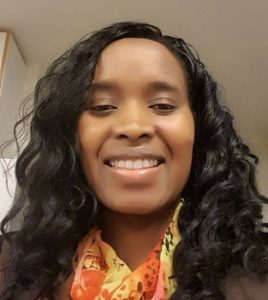 Naomy Samoei – Research Assistant & Community Engagement Lead
Naomy Samoei – Research Assistant & Community Engagement Lead
I am a Research Assistant at the University of Manchester on a project focusing on Breast Health Inequalities among the ethnic minority women to understand the facilitators and barriers to accessing care.
In addition to my research role, I serve as a Community Engagement Lead in Greater Manchester, promoting the uptake of cancer screening programs, particularly within underrepresented and marginalized communities. Through grassroots initiatives, collaboration with healthcare professionals, and culturally sensitive outreach, I work to break down misconceptions, increase awareness, and empower individuals to take proactive steps in their health journey.
My passion lies in health promotion, particularly among ethnic minority populations in the UK, where systemic and cultural barriers often contribute to health inequalities. I am committed to creating impactful, evidence-based interventions that bridge gaps in health access and education. Beyond the UK, I have a keen interest in global health promotion, advocating for equitable healthcare systems, preventive care, and health education initiatives worldwide.
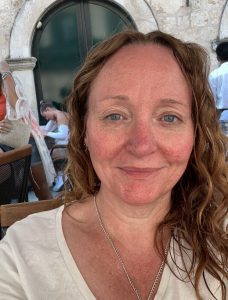 Prof Lucie Byrne-Davis
Prof Lucie Byrne-Davis
Lucie Byrne-Davis is Professor of Health Psychology & Associate Dean for Internationalisation (Teaching and Learning), Faculty of Biology, Medicine and Health, University of Manchester. She co-leads the Health Workforce Group where research, teaching and social responsibility combine to develop and maintain international health workforce. She is an expert in translational, co-developed and international behaviour change research and practice.
She has a particular focus on working within health partnerships between the UK and the Global South and studying organisational readiness to use and generate behavioural data. She is a co-founder of The Change Exchange, a prestigious collaboration of behaviour change experts engaged in research, consulting, and volunteering in the field of global health.
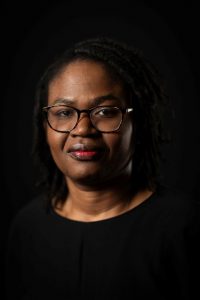 Dr Omolade Allen
Dr Omolade Allen
Dr Omolade Allen is a Lecturer in Global Health Research with a focus on enhancing access of marginalised women to health, social, and community services. Her work is closely aligned with the United Nations Sustainable Development Goals, particularly those promoting gender equality, universal healthcare, and reducing inequalities. Drawing on her background in public health, Dr Allen employs critical social theory to conduct community-based participatory action research that addresses the complex challenges faced by women and minority groups.
By leveraging the strengths of voluntary, community, faith, and social enterprise organisations, she fosters collaborative pathways to enhance healthcare utilisation, population health strengthening, and positive health outcomes. Internationally, she collaborates on initiatives to strengthen the health workforce, particularly emphasising research capacity building in rural communities.
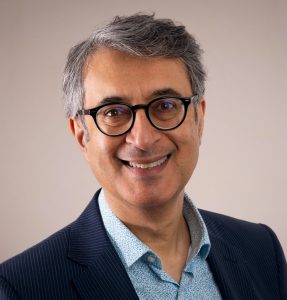 Mr Ashu Gandhi
Mr Ashu Gandhi
Mr Ashu Gandhi is a Breast Surgeon at the Nightingale and Prevent Breast Cancer Centre, Wythenshawe Hospital, one of the largest Breast Cancer units in Europe. In addition to his research on the inequalities seen in health care between different communities, he also has a research profile in hereditary breast cancer and is part of the South Manchester Breast Family History service. Mr Gandhi is part of the Manchester Breast Centre research group and has Honorary Senior Lectureship in the University of Manchester.
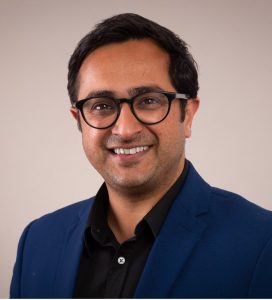 Mr Rajiv Dave
Mr Rajiv Dave
Mr Rajiv V Dave is a Consultant Oncoplastic Breast and Endocrine Surgeon, based at the Nightingale Breast Centre, at Manchester University NHS Foundation Trust. His specialist surgical training includes a Research Fellowship awarded the Patey Prize by the Society of Academic and Research Surgery, a prestigious TIG Oncoplastic Fellowship in Manchester, and an International Fellowship in Breast, Endocrine and Melanoma in Melbourne, Australia.
He has a strong academic interest and portfolio, publishing in high impact-factor peer-reviewed journals and lay-terminology patient information. He has successfully led and delivered large national collaborative studies which have informed and impacted clinical practice and has been awarded prestigious research grants. This includes the B-MaP-C study (breast cancer management pathways during the COVID-19 pandemic).
He serves in several national and international clinical leadership roles, including the Association of Breast Surgery Academic and Research Committee, and as a founding steering member of the Kenya/UK Heath Alliance. He has completed a Master’s degree in global health leadership, and his direction of research over the next few years will be focused on improving breast cancer outcomes globally, particularly amongst women from ethnic minority and disadvantaged socio-economic background.
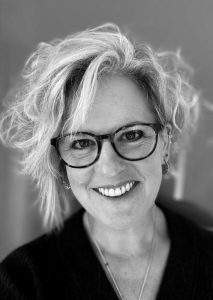 Dr Suzanne Johnson
Dr Suzanne Johnson
Dr Suzanne Johnson is the Director for Social Responsibility for the School of Medical Sciences, Senior Lecturer in the Division of Cancer Sciences, Faculty of Biology, Medicine and Health and Programme Director for the MSc Transformative Oncology.
Suz is a translational cancer researcher turned educator, to a Global audience, who is proactive in establishing inclusive working practices in both research and teaching. With a strong interest in addressing health inequalities and cancer disparities through establishing effective community engagement strategies, both locally and internationally, and inspiring the next generation to embed equity into their practice.

0 Comments